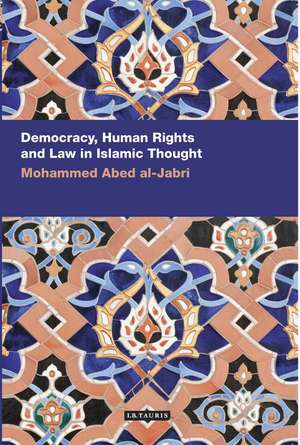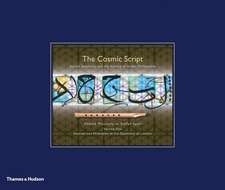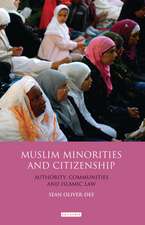Democracy, Human Rights and Law in Islamic Thought: Contemporary Arab Scholarship in the Social Sciences
Autor Mohammed Abed Al-Jabrien Limba Engleză Paperback – 16 noi 2014
Preț: 166.36 lei
Preț vechi: 203.95 lei
-18% Nou
Puncte Express: 250
Preț estimativ în valută:
31.83€ • 34.04$ • 26.54£
31.83€ • 34.04$ • 26.54£
Carte tipărită la comandă
Livrare economică 17 aprilie-01 mai
Preluare comenzi: 021 569.72.76
Specificații
ISBN-13: 9781780766508
ISBN-10: 1780766505
Pagini: 264
Dimensiuni: 156 x 234 x 23 mm
Greutate: 0.36 kg
Ediția:New.
Editura: Bloomsbury Publishing
Colecția I.B.Tauris
Seriile Contemporary Arab Scholarship in the Social Sciences, International Library of Ethnicity, Identity and Culture
Locul publicării:London, United Kingdom
ISBN-10: 1780766505
Pagini: 264
Dimensiuni: 156 x 234 x 23 mm
Greutate: 0.36 kg
Ediția:New.
Editura: Bloomsbury Publishing
Colecția I.B.Tauris
Seriile Contemporary Arab Scholarship in the Social Sciences, International Library of Ethnicity, Identity and Culture
Locul publicării:London, United Kingdom
Notă biografică
Mohammad Abed-al Jabri is Professor of Philosophy at the Mohammed V University in Rabat, Morocco. He was one of the authors of the infuential 2002 Arab Human Development Report.
Cuprins
VOLUME I: Religion, State and the Application of Islamic Shari'ahPart One: The Question of Religion and the StateChapter 1: Religion and the State in the Authoritative Cultural ReferentChapter 2: Religion and State in the Renaissance Authoritative ReferentChapter 3: Religion, Politics and Civil WarPart Two: The Question of Applying al-Shari'ahChapter 4: Awakening and RenewalChapter 5: Traditionalism (al-salafiyah). or The Historical Experience of the Nation?Chapter 6: Extremism: Right and LeftChapter 7: Extremism Between Creed and al-Shari'ahChapter 8: For the Procession of IjtihadChapter 9: The Rationality of the Rulings of al-Shari'ahChapter 10: Rulings and DependenceChapter 11: Every Age has its Special NeedsChapter 12: 'Avoid the Hudud Penalties when in Doubt'Chapter 13: Concerning 'Complete Application of al-Shari'ah'VOLUME II: Democracy and Human RightsPart One: Democracy: Its Historical Role in the Arab WorldChapter 1: A Demands in the Arab WorldChapter 2: Al-Shura and Democracy are not One and the SameChapter 3: The Difficult BirthChapter 4: Partnership in Human GovernanceChapter 5: Democracy and the Right to SpeakChapter 6: No Way Out Except Through a Historical BlocPart Two: Democracy and the Current Arab RealityChapter 7: The Problem of the Transition to DemocracyChapter 8: Objective Situations Conducive to DemocracyChapter 9: Contemporary Arab Ideology and its Doubts about DemocracyChapter 10: Dispersing the Doubts about DemocracyChapter 11: The State that Swallows up SocietyChapter 12: Civil Society and the Elites in the Arab NationChapter 13: Elites Fear DemocracyChapter 14: Democracy, a NecessityPart Three: Cultural Implantation of Human Rights in the Contemporary Arab ConscienceChapter 15: Human Rights: Particularity and UniversalityChapter 16: Universality of Human Rights in the European Point of ReferenceChapter 17: Universality of Human Rights in the Islamic Authoritative Point of Reference: Reason and Innate NatureChapter 18: Universality of Human Rights in the Islamic Authoritative Point of Reference: Covenant and al-ShuraChapter 19: Philosophy of Human Rights and ReligionChapter 20: Freedom is One Things, Apostasy AnotherChapter 21: Women's Rights in Islam: Between the Fundamental Principles of al-Shari'ah and its Particular RulingsPart Four: Enhancing Awareness of Human Rights in IslamChapter 22: The Concept of the Human Being in Modern ThoughChapter 23: The Concept of the Human Being in the Qur'anChapter 24: The Right to Life and its EnjoymentChapter 25: The Right to Freedom of Belief, Knowledge and DifferenceChapter 26: Al-Shura between the Qur'an and the Circumstantial InterpretationsChapter 27: The Right to Equality and the Question of 'Preference'Chapter 28: Slavery and the Rights of Women Chapter 29: The Right to Justice: The Strength of the Qur'anic Text and the Vacillation of the 'Advisory Discourse'Chapter 30: The Rights of the Weak Oppressed: The Right of the Poor to the Wealth of the RichChapter 31: Social Security in Islam: Necessity of DevelopmentChapter 32: The Rights of God, the Rights of People: Application of al-Shari'ah





















